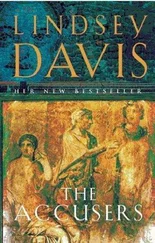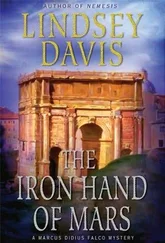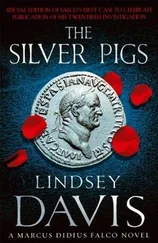Lindsey Davis - Graveyard of the Hesperides
Здесь есть возможность читать онлайн «Lindsey Davis - Graveyard of the Hesperides» весь текст электронной книги совершенно бесплатно (целиком полную версию без сокращений). В некоторых случаях можно слушать аудио, скачать через торрент в формате fb2 и присутствует краткое содержание. Год выпуска: 0101, ISBN: 0101, Издательство: St. Martin, Жанр: Исторический детектив, на английском языке. Описание произведения, (предисловие) а так же отзывы посетителей доступны на портале библиотеки ЛибКат.
- Название:Graveyard of the Hesperides
- Автор:
- Издательство:St. Martin
- Жанр:
- Год:0101
- ISBN:9781466891449
- Рейтинг книги:5 / 5. Голосов: 1
-
Избранное:Добавить в избранное
- Отзывы:
-
Ваша оценка:
- 100
- 1
- 2
- 3
- 4
- 5
Graveyard of the Hesperides: краткое содержание, описание и аннотация
Предлагаем к чтению аннотацию, описание, краткое содержание или предисловие (зависит от того, что написал сам автор книги «Graveyard of the Hesperides»). Если вы не нашли необходимую информацию о книге — напишите в комментариях, мы постараемся отыскать её.
Graveyard of the Hesperides — читать онлайн бесплатно полную книгу (весь текст) целиком
Ниже представлен текст книги, разбитый по страницам. Система сохранения места последней прочитанной страницы, позволяет с удобством читать онлайн бесплатно книгу «Graveyard of the Hesperides», без необходимости каждый раз заново искать на чём Вы остановились. Поставьте закладку, и сможете в любой момент перейти на страницу, на которой закончили чтение.
Интервал:
Закладка:
“So the poor Hesperides corpses will have to lie a little longer underground?”
“Delay is reprehensible but we can make up time later…”
He did not care about the excavation being delayed. As my dress pins scattered on the floor mat, the most excellent Tiberius Manlius had only one thing on his mind. It did not involve finding buried bodies.
XVII
By early evening we were back at the bar, with a packed courtyard. The cooler hours before sunset were genuinely best for heavy digging. Tiberius and I had returned, relaxed, bathed, refreshed by one another, then by cakes and mulsum, ready for whatever grim discovery awaited.
Nosy, self-nominated experts came to witness our opening of the ground. As a row of workmen set about digging up the entire courtyard from its outer wall to the bar interior, first Morellus turned up. This was not his jurisdiction; the inquisitive swine claimed he was here to help Tiberius and me decipher any evidence. Such goodness of heart!
Officers from the Third Cohort, those tiresome men who had previously dismissed the request for advice, soon joined us too. It was their patch; crime was suspected; they could not be turned away. Fortunately they took to Morellus. The group settled down as sideline observers, heads together, bringing a somber, militaristic presence. None of them offered to help dig. Tiberius Manlius put them to shame when he stripped to his under-tunic and weighed in alongside his men.
I had learned why he looked so much at home doing this. That afternoon we had grown closer. For a start, I was seeing how our future life would be, with its pleasurable mix of working and living as a couple.
At home earlier, I had contrasted the intimacy and fulfillment we shared in bed against the paid, time-limited, one-sided sex that customers bought in bars and brothels like this. I had balanced our ideal pleasure against the trade other people indulged in: mechanical action with faked climax, the risk of assault, joylessness, guilt. And now the sorriest consequence of this particular bar’s commerce was to be revealed.
As Tiberius put his back into digging, I now knew he was born to the building trade. On our way back here, I had asked how he could settle so readily into it. He explained that his grandfather, on his father’s side, had been a contractor. When the Emperor Augustus boasted that he found Rome made of brick and left it marble, the elder Manlius Faustus was the one who installed that marble. He worked on public monuments, then later built homes in the country for other plebeian families who had made good and were retiring from city life. His own son moved out to the country, becoming an estate farmer and never working in the family business.
The grandfather carried on until his death. I had heard Tiberius speak passionately of marble, and I now understood that; as a lad he had loved to visit building sites with his grandpa, who had been delighted that his only grandson took so much interest. Tiberius observed and absorbed every kind of knowledge.
His parents’ marriage had been a love match; their families became acquainted because one of his grandfathers supplied warehouse storage for the other’s costly marble. So, when Tiberius was orphaned, it seemed natural for his maternal uncle, Tullius, by then in charge of the warehouse empire, to take him in. One day Tiberius would inherit everything. That had never encouraged the suspicious Tullius to involve him closely. So now there was friction and argument, occasioned by Tiberius branching out, back into the business on his father’s side. I wondered whether Uncle Tullius regarded warehouse management as a clean-hands occupation, while perhaps he looked down on building.
He would loathe seeing his nephew at this moment, covered with dust, organizing trenches, unearthing gruesome finds, wielding a hefty pick as if he had always done so. Uncle Tullius and I had clashed already, so I knew he would resent seeing me here too, itemizing finds, plotting them on a map I had drawn of the courtyard, in a team with his rebellious nephew. For Tiberius, this new life fulfilled the wish of someone he had specially loved, and I could see that mattered to him deeply. He also cared that I played such a willing part in it.
That was why the Garden of the Hesperides would be an important experience for us. It was an ordinary bar. Even the fate of its missing waitress was mundane, common enough for a woman in that world. However, with this project Manlius Faustus had begun rebuilding lost family connections. It made him happy. I was happy for his sake and even began to accept the wedding ceremony he wanted; it would publicly mark this turning point in his life.
Of course I might still niggle him about the wedding. But, whether in Roman peristyle or British round hut, niggling was what a wife did. A good husband shrugged off, or maybe even enjoyed, the tussle.
It made me think more keenly about Rufia. Had she cut up rough in some domestic argument that nobody shrugged off? Whereas I had independent free speech with a tolerant man, had she been cruelly battered to death for her outspokenness?
We had brought back the basket of original finds from the Aventine. Waiting members of the vigiles took out Rufia’s bones, which they passed around with their usual terrible, out-of-place jokes, although those were superseded by sucked teeth and heavy silence as the workmen made grisly new finds. The troops always used graveyard humor to make tragedy endurable, yet they had a basic respect for the untimely dead. They were slapdash, untrained, unsystematic hard men, but it was not entirely their fault; they were, too, undermanned, poorly supervised, despised by the public and shoved into all kinds of danger on a daily basis, generally without thanks. Someone had to investigate. Under the shabby bravado, they did want a proper resolution. Their methods might be crude but, according to their practice, they would see it through.
Our men soon produced plenty to cause deploring head shakes.
Right at the center of the courtyard we found a single burial that seemed very old, just a cluster of fragmented bones, together with a crude pot and several unmatched colored stone beads. Faustus decreed this burial was unconnected to the rest, rather some ancient interment whose history we could never learn. Morellus and Macer, the chief investigator of the Third, exchanged mutters in a huddle, then agreed. But the next finds were different.
Around the edge of the yard were a set of surprisingly neat burials. They appeared to be all of one date. The bodies were laid out straight. Nothing was found with them. “Stripped,” said Morellus laconically. “Every stitch removed. No wrappings. No grave goods to help them down in Hades.”
“Not even a coin to pay the ferryman over the Styx,” added Macer. He was a wiry tyke with bandy legs and a dismal attitude. “That will upset the thieving guild of river boatmen!”
Morellus decreed, “I think we can assume these poor sods were not planted in the earth by loving sons, pious wives or freed slaves honoring their kind old masters.”
“They all are nicely set, no bent legs, hands in their laps, no heads off,” Macer commented. “Me, I do like to see a bit of care in an unlawful burial.”
“So we’re looking for a surveyor?” joked Morellus, bending low to peer at the nearest skeleton while eyeing it up as if using a straight edge.
“Oh just a landlord who wanted to remember where he must not let his gardener plant lavender.”
“You have a sweet imagination, brother!”
“Herbs in a bar garden, always welcome! Brings the bees. A bee might sting your girlfriend, so you get to go down her tunic and soothe the pain for her.” They glanced at Tiberius and me.
Ignoring their lewd asides, I decided to impose professionalism. “I count five now, plus the one we think is Rufia. Her grave was badly disturbed before anyone realized what it was, so her bones are a bit jumbled. But the odd leg we dug up yesterday seems to have come off number four. Can’t tell whose was the dog Morellus identified, nor who took a chicken supper to Hades with him.”
Читать дальшеИнтервал:
Закладка:
Похожие книги на «Graveyard of the Hesperides»
Представляем Вашему вниманию похожие книги на «Graveyard of the Hesperides» списком для выбора. Мы отобрали схожую по названию и смыслу литературу в надежде предоставить читателям больше вариантов отыскать новые, интересные, ещё непрочитанные произведения.
Обсуждение, отзывы о книге «Graveyard of the Hesperides» и просто собственные мнения читателей. Оставьте ваши комментарии, напишите, что Вы думаете о произведении, его смысле или главных героях. Укажите что конкретно понравилось, а что нет, и почему Вы так считаете.












